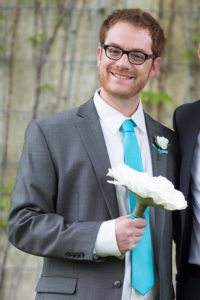“…and lead us not into temptation, but deliver us from evil. For thine is the kingdom, and the power, and the glory, forever and ever.”
Oy vey.
Two of my dear friends married each other this weekend, and I had the privilege of standing at the wedding. This was not my first groomsman gig; in the past year alone, I’ve stood in three weddings. It’s a strange thing, to be sure.
I am always honored to be selected, eager to be showered with swag and free booze, but never quite sure what to say or do. As a groomsman, you represent the man, his friendships, his past, present and future. You’re there to help usher him into the next phase of life. But during this incredibly special moment, you’re really just standing there. You look out into the audience and realize no one is looking at you and your focus becomes finding the strength to stand continuously for 20 minutes.
Then it’s time to party.
This wedding, however, was a bit different. The ceremony had all the usual suspects: bride, groom, officiator, family, and friends. But there was one very conspicuous, somewhat unexpected guest: God.
The ceremony opened with a prayer, and was officiated by an Episcopal minister. Phrases like “we stand here before God” and “let your union flourish in God’s eyes” were prevalent, and the ceremony ended with a group recitation of The Lord’s Prayer.
I was surprised, nay shocked, at how emotionally connected I felt to the spirituality of this event.
Yes, this was a Christian wedding. “Oh no!” I immediately thought. I’m not religious! This is weird! Should I leave? Should I bow my head in prayer, and say “Amen?”
I was, decidedly, the only Jew in the wedding party. Most had chosen God; I was the only one to have been Chosen. After immediately realizing that this was my first time literally being “The Last Jew Standing,” I began to ponder the meaning of my participation.
At first, I felt dissociated and a bit uncomfortable by this religious dissonance. You see, I am both a Jew and an Atheist, a seemingly contradictory identity, the explanation of which is for a different column. But as the wedding carried on, I felt myself contemplating the idea of religion at such an event.
Indeed, at the core of any wedding is a celebration of love. Religion need not play a role in the union of two partners, and what with the hot national debate over gay marriage, some may argue that it should not. But I was surprised, nay shocked, at how emotionally connected I felt to the spirituality of this event.
I was given a new understanding of a “blessed union.” I actually got to experience religion as a kind of binding agent. Sure, most couples who get married love each other. And religious people feel close to God. But there was something special about the combination of the two, the synergy of a Love for each other and a Love of God. Both ideas were complemented and heightened by the other.
Skepticism and cynicism can be very difficult sometimes. They blind you from faith, even in non-religious forms. I came to realize, as I watched the birth of this marriage, that faith is something we all must have. We all should believe in something. If we don’t, then we won’t trust in anything. And if we don’t trust, then we can’t love and be vulnerable and care about anything outside ourselves.
This experience changed me, both as a Jew and as a person. By no means was I “converted” or “shown the light.” I am still a cultural Jew with no religious affinity. But after the wedding, I think I have a new respect for Belief. It makes me want more faith and more trust. It makes me want to love people. It makes me want to be a better Jew and a better person. I am more skeptical of skepticism, and cynical about the cynics.
The Lord’s Prayer may not be part of my religion, or even my life, but it is a beautiful poem with a beautiful message: Let our lives not be darkened by negativity or hatred. Let us lead a blessed life. Let us Believe.
Whatever that may mean to you.
Email me at [email protected]


